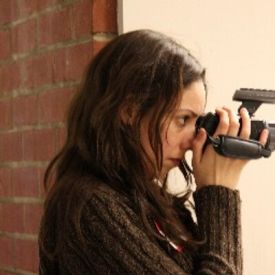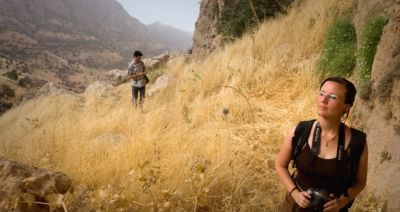By Elias Savada.
World premiering as part of the Washington Post Film Strand at this year’s AFI DOCS is The Three Hikers, the freshman feature from rookie director Natalie Avital, an actress known or unknown for appearances in dozens of short subjects, supporting roles in the slow-burn horror entry Shallow Ground (2004) and the award-winning (including Best Indie Supporting Female Actor, L.A. Indies) feature Shamelove (2006), as well as having served as a casting director and occasionally handled producing chores. It’s an informative yet wobbly debut. The timeline starts at the same point (November 4, 1979) as Ben Affleck’s Argo (2012) did, as protesting militants invade the American Embassy in Tehran and take dozens of diplomats and staff hostage, held in captivity for over 14 months. Avital uses this event only to jumpstart her film, espousing on the now decades-long schism between Iran and the U.S., fueled by the continued concern about the former’s nuclear capabilities. That rupture of relations would lead to the 2009 ordeal chronicled here involving three Americans — Sarah Shourd, Shane Bauer, and Joshua Fattal — who became political pawns after accidentally stepping over the Iraqi border, just a month after the angst-inducing, vote-rigged national elections that fueled violent protests in Iran.
Lots of fuzzy standard definition news footage brings up the urgency of their capture, and the three principles provide indirect audio interviews revealing their own personal, historical, and social slant on the circumstances that led to their 2-year-plus confinement. Sarah was the activist/peace observer, Shane (her life partner) a journalist for The Nation, while Josh was on a study-abroad program. They went sightseeing in the other Iraq (Kurdistan), plugged as a vacation area (“It’s spectacular. It’s peaceful. It’s joyful”). Adventurous kids, they eventually landed in the border town Ahmed Awa, home to a lovely waterfall. They took a walk. And stepped over the unmarked border.
 Throughout the film’s first third and in snippets later, the filmmaker relies on an abundance of Ken Burns effects, shallow focus shots, and shaky cell phone videos. But there are way too many heavy handed scene reenactments (emphatic focus pulls, sharp edits, dramatic sound effects), nearly always involving the prisoners in jail. It’s a distracting technique that can be used to good effect (The Imposter, The Act of Killing, Touching the Void, Man on Wire). It is less successful here.
Throughout the film’s first third and in snippets later, the filmmaker relies on an abundance of Ken Burns effects, shallow focus shots, and shaky cell phone videos. But there are way too many heavy handed scene reenactments (emphatic focus pulls, sharp edits, dramatic sound effects), nearly always involving the prisoners in jail. It’s a distracting technique that can be used to good effect (The Imposter, The Act of Killing, Touching the Void, Man on Wire). It is less successful here.
Back story interview footage shot in Pine City, Minnesota (Shane’s parents and sister); Elkins Park, Pennsylvania (Josh’s mom Laura, brother Alex, and his Iraqi-born, Israeli-raised father Jacob); and Oakland, California (Nora Shourd, Sarah’s mother) are manipulated with a dread-filled score by Frederik Wiedmann. Politicians and policy experts chime in.
Taking the events in chronological order, Avital ticks days off a chalk board style calendar (skipping weeks and months as the 96-minute film ambles along). Anniversaries are marked (200 days, 1 year, trial starts and postponements, etc.) as the parents, on camera, talk in retrospect about their peaceful-turned-nightmarish lives, filled with worry about their children. Meanwhile, Sarah (in solitary), Shane and Joshua (together), housed at the Evin House of Detention in Tehran, are held for crimes punishable by death. We hear their voices (recorded long after the crisis is over) of the regimens and obsessive behaviors they used to avoid the boredom of the situation. It’s interesting to hear their discourse about events, but the incessant re-creations (including soft-focusing close-ups of hands cleaning a sink or tired eyes blinking, or a hand-held, off-center camera set at an anguish-inducing angle), continue to be an unsettling intrusion.
The Three Hikers has a by-the-numbers look and feel. It wants to tell an urgent story, occasionally invoking motifs from Alan Parker’s troubling Midnight Express (1978), but there aren’t enough smarts to truly mimic the prison horrors that the three captives endured. Where the film partially succeeds is emphasizing how the parents, siblings, and other family members struggled and survived the mental Sturm und Drang that nearly broke their stress-filled units apart. All the candle-light vigils., human rights marches, and public and behind-the-scenes support provide an informative perspective of events that nearly every American followed over its lengthy ordeal.
The last quarter of the film opts for extended, feel good, life-affirming moments, although there is urgency about the social issues (solitary confinement, the prison system, the implications of law and society) of which each of the former hostages has now embraced.
The story is all there in The Three Hikers, but the means to its earnest end could have used a sharper focus.
Elias Savada is a movie copyright researcher, critic, craft beer geek, and avid genealogist based in Bethesda, Maryland. He helps program the Spooky Movie International Movie Film Festival, and previously reviewed for Film Threat and Nitrate Online. He is an executive producer of the new horror film German Angst and co-author, with David J. Skal, of Dark Carnival: the Secret World of Tod Browning.

